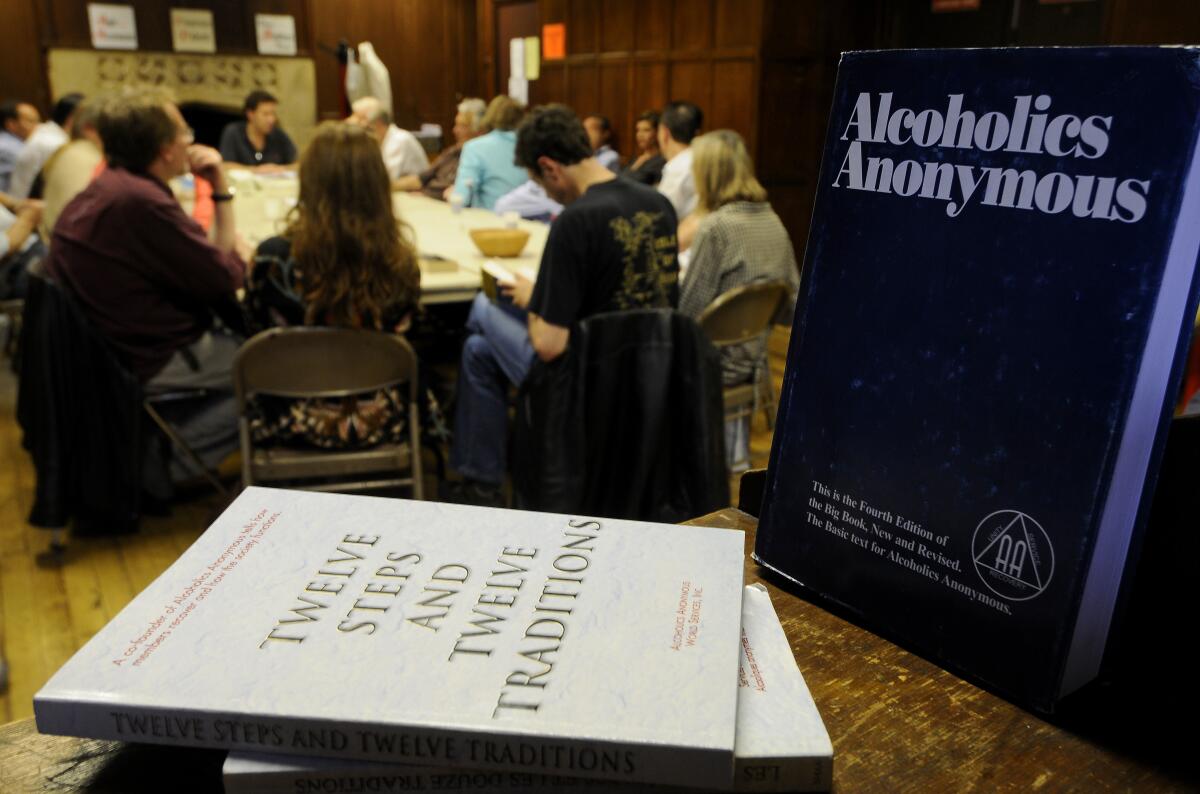What not to say to recovering alcoholics during the holidays

- Share via
My name is Paul, and I’m an alcoholic.
I’ve said that hundreds of times behind closed doors — some in Alcoholics Anonymous meetings, but mostly in secular recovery groups. Truth be told, I haven’t uttered those words in years, because I haven’t been to a meeting in years. But with the holidays upon us, I suspect I’ll be sharing that part of my life in the coming weeks, so why not start here?
If you notice people drink more in December, recovering alcoholics notice it a lot more. Right now, in recovery meetings across the country, I have no doubt that participants are discussing their anxieties and coping strategies for this time of year. The holidays present challenges for anyone who knows the pain of addiction (I’ll get to that in a bit), but especially for people with alcohol use disorder.
In any month, my drug of choice sits on the shelves of at least four stores within easy walking distance of where I sit — and during the holidays, seemingly everyone becomes a pusher. Thanksgiving or Christmas dinners aren’t toasted with pill bottles of Percocet raised in the air. There are no cakes soaked in cocaine or sauces that we’re told are fine to eat because the heroin has been boiled out.
This isn’t to diminish other addictions, but only to show the peculiarity of recovering from a socially acceptable, even celebrated drug.
And speaking of celebrations — oh, the parties and their awkward, alcohol-sodden conversations. Most people don’t give a thought to the glass of seltzer I’ve been holding all night, because fixating on someone else’s drink is generally something non-alcoholics don’t do. But there have been the occasional persistent types who truly wonder if no drinking really means no drinking (it does), or if the holidays mean a holiday from sobriety (they don’t).
Rarer yet — but extremely bothersome — are the self-styled contrarians eager to needle me about the usefulness of alcohol abstinence in addiction recovery. Today you might know these as people who “do their own research,” but plenty of us in recovery encountered this personality type long before vaccine refusal took off during the pandemic. I did my own research before trying sobriety almost nine years ago, mostly as an excuse to keep drinking.
In short, if you’re a non-alcoholic drinker (a “normie,” in recovery lingo) and can see yourself doing any of this at a holiday party, please don’t. Sating your curiosity isn’t worth risking an alcoholic’s sobriety, even if that isn’t your intention. I’ve found that people like me welcome conversations about alcoholism only with others who have gone through this (it’s the active ingredient of recovery), and we tend to find each other in situations where everyone else is drinking.
After years of sobriety, steeling myself for boozy holiday gatherings is second nature. I feel safe saying peer pressure won’t push me off the wagon, but there’s still a kind of loneliness that hangs over all the seasonal conviviality. At times, it feels as if I’m watching it all through a window. Over the years, that sense of being left out has become less acute, but it’s there.
Of course, these pangs of loneliness don’t come close to matching the unrelenting pain of active addiction. “Pain” is a key word here, and I’ll never forgot how it unlocked my sobriety years ago when an older and much wiser recovering alcoholic said this to me: “We can talk all we want about strategies and steps, but nothing will work until you realize that you’re in pain. Pain! Deep, lizard-brain pain! Addiction is pain!”
Loneliness. Pain. Hopelessness. These are themes that routinely come up in recovery meetings, and they’re feelings that all the trappings of the holiday season — with its focus on family and togetherness — can trigger in both active addicts and those in early recovery.
So, for people navigating the holidays early in their sobriety, I am rooting for you. And if you attend recovery meetings, ask for a list with phone numbers to call or text in a crisis. Don’t hesitate to reach out any time (and I mean any time) if you feel the pull of alcohol or whatever your drug of choice is.
Alcoholics Anonymous groups in L.A. County and elsewhere have 24-hour hotlines; so do the federal Substance Abuse and Mental Health Services Administration and other organizations, staffed with compassionate volunteers waiting to listen, especially during the holidays.
Know that you’re not alone. More than 20 million Americans are in addiction recovery, and people who’ve walked this path can be your best resource during the holidays and the rest of the year.
More to Read
A cure for the common opinion
Get thought-provoking perspectives with our weekly newsletter.
You may occasionally receive promotional content from the Los Angeles Times.










